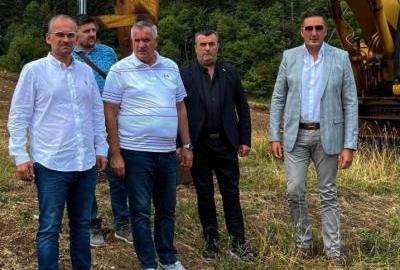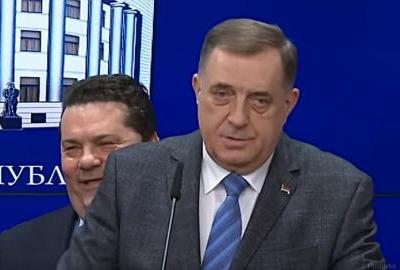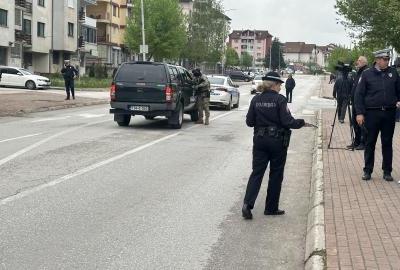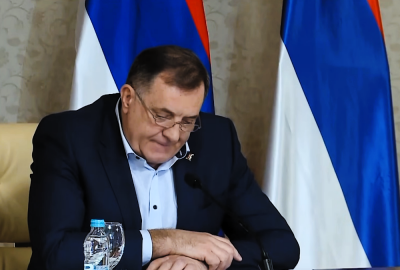Istražujemo
THROUGH INTELLIGENCE SERVICES TO THE TARGET: How Russia is exercising influence on the judicial system in BiH
The institution that hosted the President of the HJPC Milan Tegeltija in Russia in 2018 and 2019, having “the interests of the citizens and the state of Bosnia and Herzegovina in mind”, has been unofficially registered as an aide of the Main Intelligence Administration of Russia (GRU)
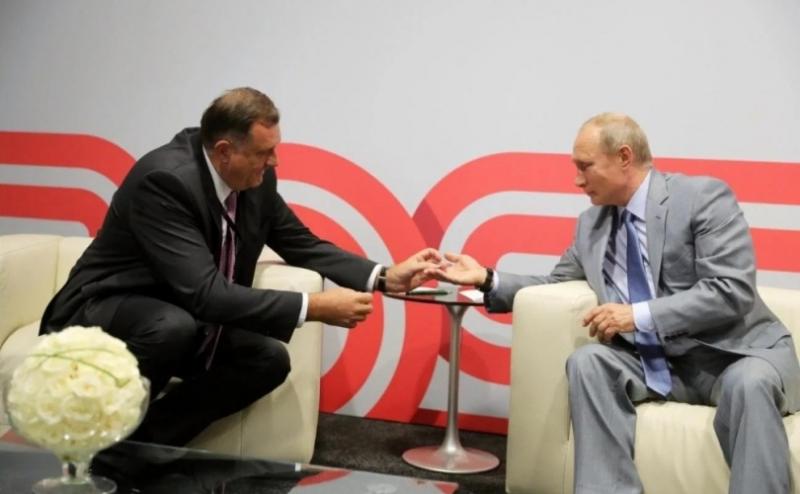
The Russian diplomats in BiH react particularly zealously when it comes to the judiciary of Bosnia and Herzegovina. It all comes down to declarative support to the changes in the judicial system, but only in part that suits the current politics propagated by SNSD and its leader Milorad Dodik.
Russian Ambassador Ivancov had supported holding of the referendum in Republika Srpska on January 9 as the national day of this entity. The views of Milorad Dodik and the leader of HDZ BiH, Dragan Čović, on the termination of mandate for the three foreign judges of the Constitutional Court of BiH also received support at the beginning of the year, following the Constitutional Court’s decision that the state, not the entities, owns agricultural land.
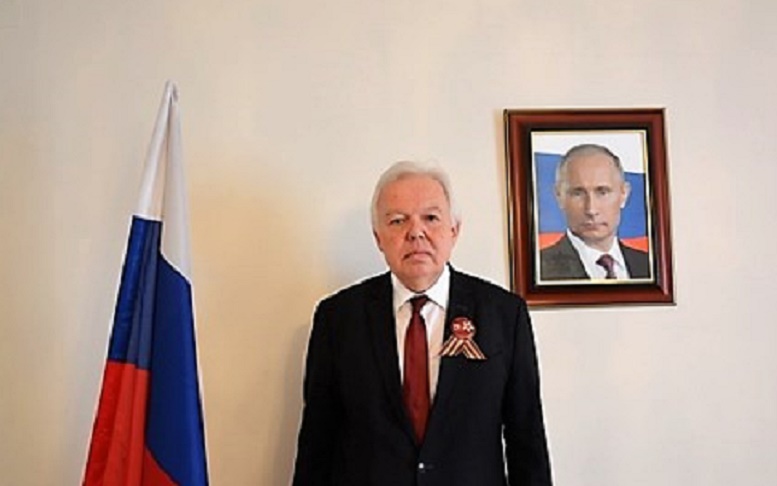
Petr Ivancov
Lawyer Almin Dautbegović, a PhD Law degree holder teaching at the several faculties in BiH and Belgrade, has been for many years now pointing out the unfulfilled expectations and the need for the BiH judicial system reform. He does not see the positions of Russia as the proof of its influence on the judiciary in Bosnia and Herzegovina, but rather as a sequence of political support it provides to Republika Srpska.
“These are inserts from the everyday life. They have a common denominator. The one who acts in that way, follows what they say in Republika Srpska that the judiciary should be as agreed in Dayton. I see Russia as a country that supports the views of RS, because these views are closer to them than what is being propagated in the other parts of the country. It is public knowledge and political reality, and the politics is the art of possible”, says Dautbegović.
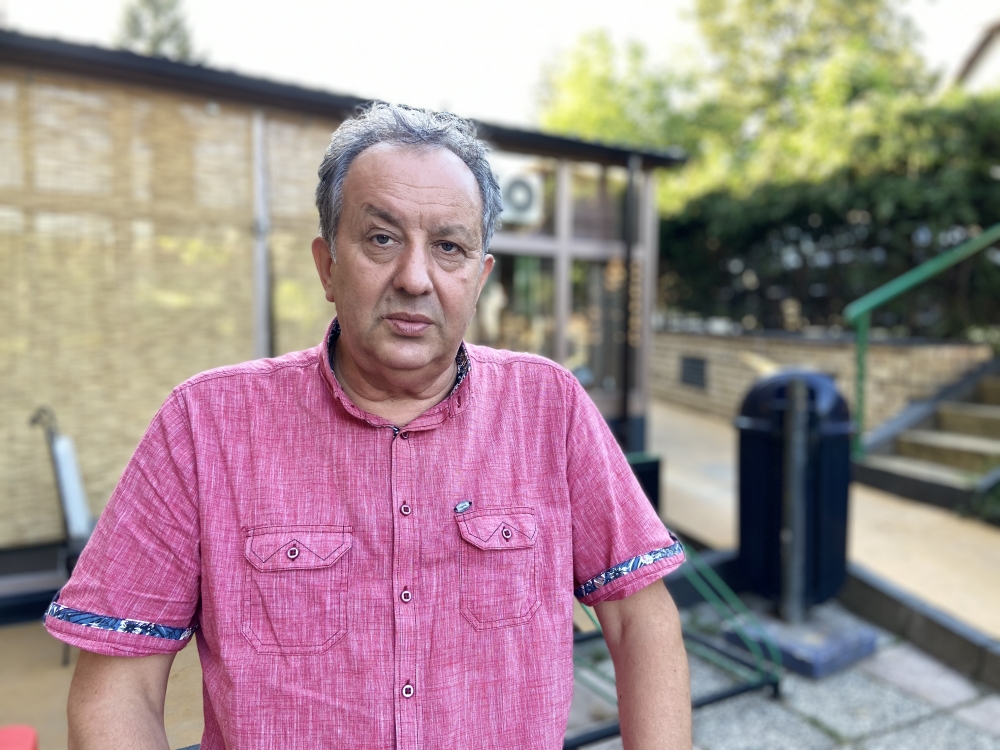
Almin Dautbegović
Retired journalist Đuro Kozar has been following geopolitical affairs for a long time, and Russia’s actions in this area are an unavoidable subject of his interest. It is obvious, he says, that the Russian Ambassador to BiH Ivancov supports Dodik in everything, even in the unfounded criticism of the judiciary.
“The Russians emphasize the independence of judiciary in BiH, but are themselves biased when it suits them. Ivancov is often with Dodik, as if he were the ambassador to RS, not to BiH, because he is rarely with the state-level officials, and almost never with those from the Federation of BiH. It is the Russian way of making BiH meaningless as a state and damaging its reputation in the world. The Russians are reiterating Dodik’s platitude that only Serbs are being tried for war crimes in BiH, which is not true, because there are Bosniaks and Croats among those accused and convicted”, says Kozar.
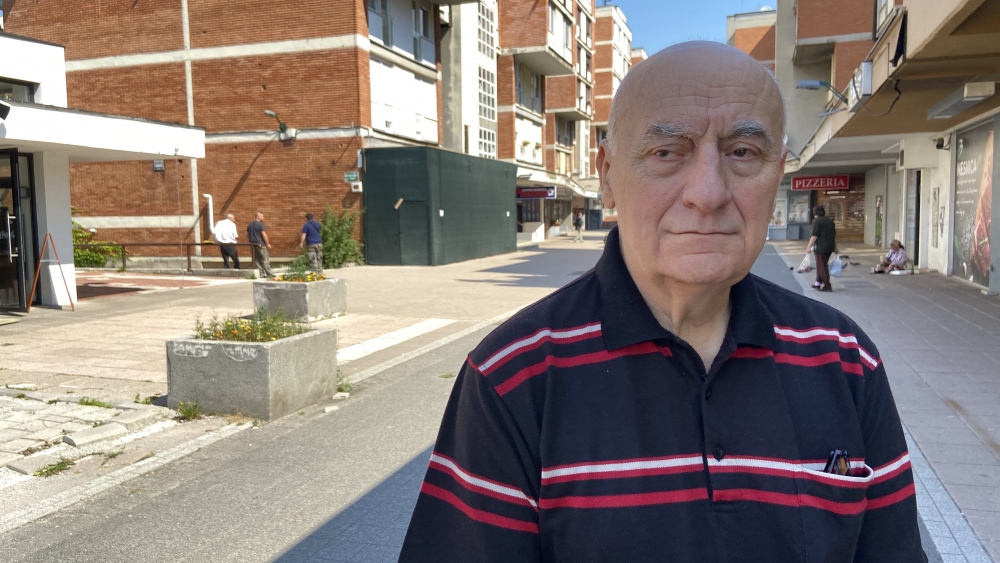
Đuro Kozar
On the other hand, the Russian Embassy has never reacted to the inefficiency of the judiciary when it comes to major corruption affairs, especially the ones involving actors from its favorite parties, SNSD and HDZ BiH. However, the reaction came after the alleged threats to the Chief Prosecutor, Gordana Tadić, during the investigation in the “Ventilators” affair, which had resulted in the arrest of the FBiH Prime Minister, Fadil Novalić.
“We are following with concern the development of situation in the area of judiciary, particularly in the context of recent developments in the Federation of BiH. We consider unacceptable the attempts to exert political pressure on the court and the prosecutor’s office, which must be given the possibility of independent, impartial and professional work in accordance with the law. Cases of threats to the judicial and prosecutorial officers must be taken seriously and prosecuted urgently”, read the statement of the Embassy of Russia in BiH.
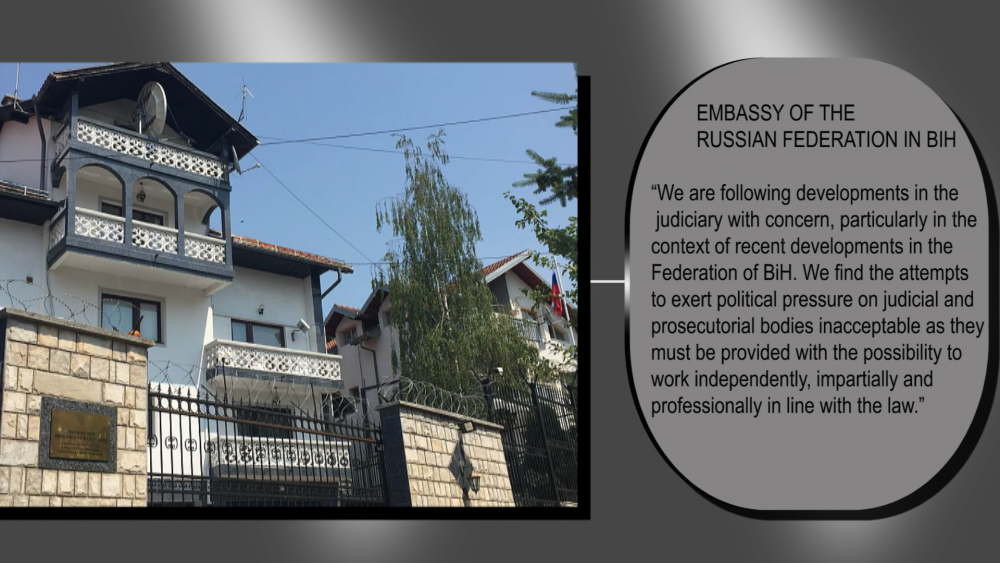
Ambassador Ivancov met the Chief Prosecutor, Gordana Tadić, at the beginning of March 2019. The short press release read that the interlocutors discussed “strengthening the rule of law in Bosnia and Herzegovina, and cooperation in the framework of the international legal assistance.”
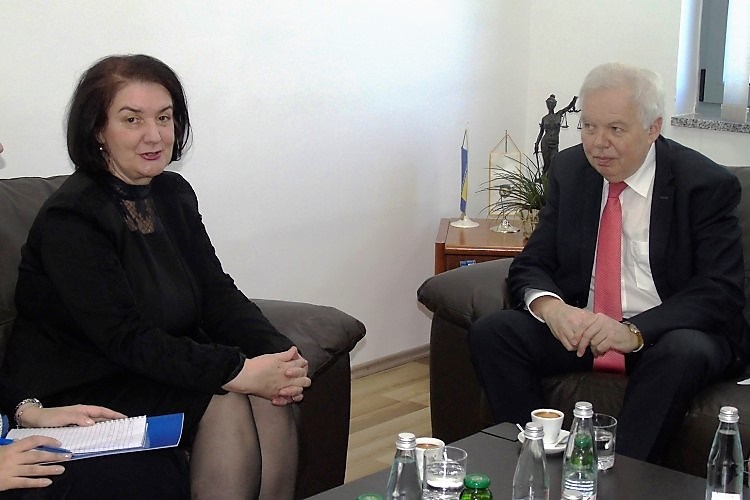
Gordana Tadić and Petr Ivancov
“Where did you get the information on the Russian influence in BiH? Is a foreign or a domestic intelligence service paying you to do that”, asked prosecutor of the BiH Prosecutor’s Office, Oleg Čavka, journalist of Žurnal two weeks later, thus inadvertently revealing possible additional topics of discussion between Tadić and Ivancov.
Everything will become clearer a few months later. Žurnal published a story that the media will name “Potkivanje affair” (bribing, lit. horseshoeing). In the presented video, the president of the High Judicial and Prosecutorial Council of BiH (HJPC), Milan Tegeltija, promises businessman Nermin Alešević that he will talk to the chief prosecutor of the Cantonal Prosecutor’s Office Sarajevo, Dalida Burzić, to expedite a case.
The video then shows how Marko Pandža, an employee of the BiH State Investigation and Protection Agency (SIPA), as the mediator of the meeting, taking money from Alešavić for the “service”, claiming that the money is (also) intended for Tegeltija.
Fierce reactions of the public followed, and resulted in a protest in front of the building of the Court and Prosecutor’s Office of BiH, where the HJPC is located, demanding Tegeltija’s resignation. Dissatisfaction was expressed with the situation in the BiH judiciary, which, according to many experts, was largely generated by the Tegeltija-led structure.
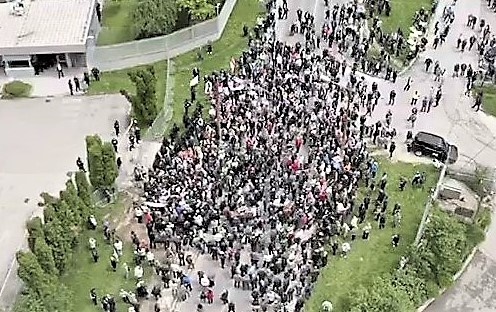
One of the few who eagerly defended the HJPC and its president Milan Tegeltija in those days was the Ambassador of Russia to BiH Petr Ivancov. He even characterized the negative attitude of the Office of the High Representative towards Tegeltija and his actions as undermining of the rights in BiH, thereat expressing an insulting attitude towards Žurnal.
“I saw the video. I am neither an investigator nor a judge. As far as I know, Tegeltija gave an explanation of what can be seen in the video and the disciplinary commission accepted it. I have some doubts about the source of this video. I am familiar with Žurnal’s sources. As far as I am concerned, portal Žurnal is not credible”, said Ivancov.
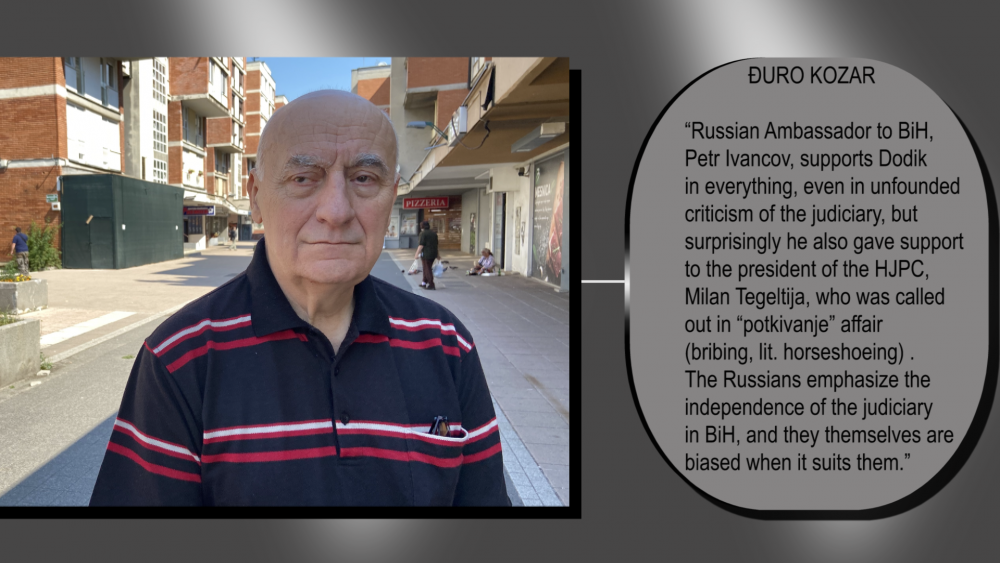
The judge of the Court of Bosnia and Herzegovina, Branko Perić, was first president of the HJCP after its establishment in 2004. He is one of the few people in the judiciary who openly criticizes negative phenomena. This was also the case after details of the affair involving the president of the HJPC were published.
“Milan Tegeltija has handed the judiciary over to the ruling politics with the assistance of majority he has gathered in the HJCP. The ruling politics control the judiciary through the HJPC and it does not have to be specially proven. All of us in judiciary know that people who were chosen to manage the most important judicial institution are in no respect the best or the most competent, but rather have influential political figures behind them. It will soon be revealed if it is a political project to destroy the institutions from within or a mere desire of individuals from the political arena to protect themselves from criminal prosecution”, said Perić for Inforadar portal.
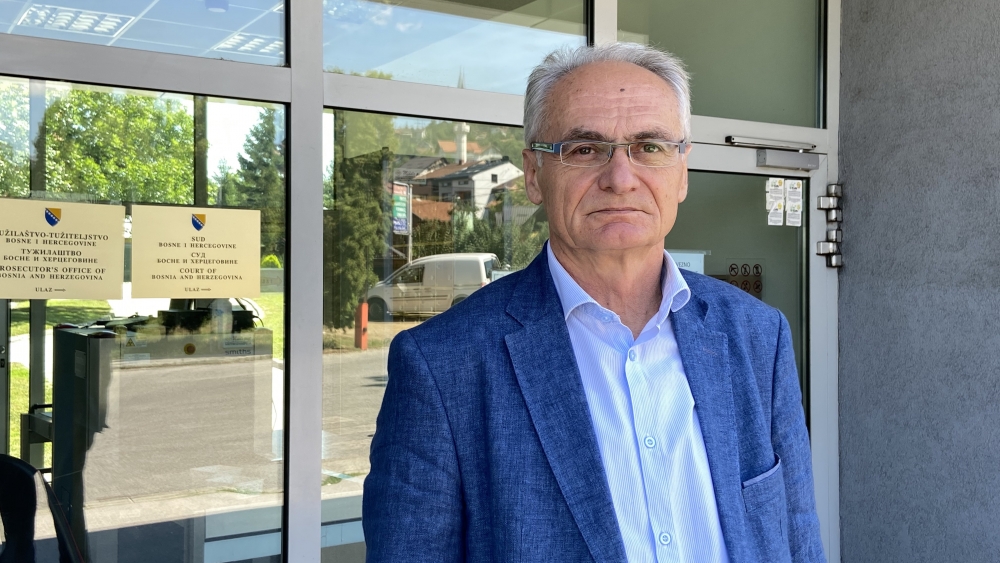
Branko Perić
A year later, in an interview for Žurnal, Perić said that his views today are the same and that the situation in the judiciary has not changed. He places Russia’s influence on developments in this segment of government in Bosnia and Herzegovina in parallel with the political influences that both directly and indirectly control and influence investigations and judicial proceedings, but does not rule out individual cases.
“I have no information about Russian influence on judiciary. I have heard that the HJPC’s president Milan Tegeltija had an official visit to Russia. The general public in BiH does not know the reason of the visit and the topics of discussion. Activities of the HJPC’s president are under a veil of secrecy. It can give rise to suspicion. If there is any influence, it is played out at the political level and through political elements”, Perić reveals.
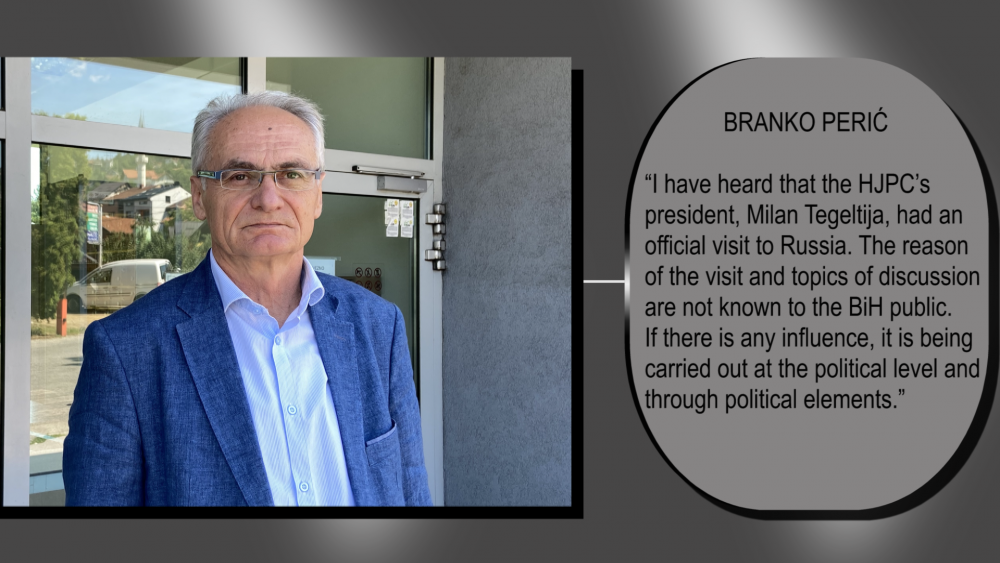
Žurnal have asked the HJPC’s president to provide information about his visits to Russia, organizers, reasons and the subsequent effects of the visits.
The HJPC confirmed two Tageltija’s visits to Russia, while referencing to the organizer’s website for details.
“The first official visit was to Sochi from October 9 to October 13, 2018 and related to the participation of president Tegeltija in the IX International conference on enforcement of judicial decisions and decisions of competent bodies, while the second official visit was to Moscow from July 31 to August 3, 2019 and related to the participation of president Tegeltija in the X International conference on enforcement of judicial decisions and decisions of competent bodies. Both conferences have made an important contribution to the exchange of experience between the judicial and law enforcement institutions and services of the countries from around the world with the aim to improve the efficiency of the procedure for the enforcement of judicial decisions in preserving the rights and legitimate interests of the citizens and the state of Bosnia and Herzegovina”, read the response from the HJCP.
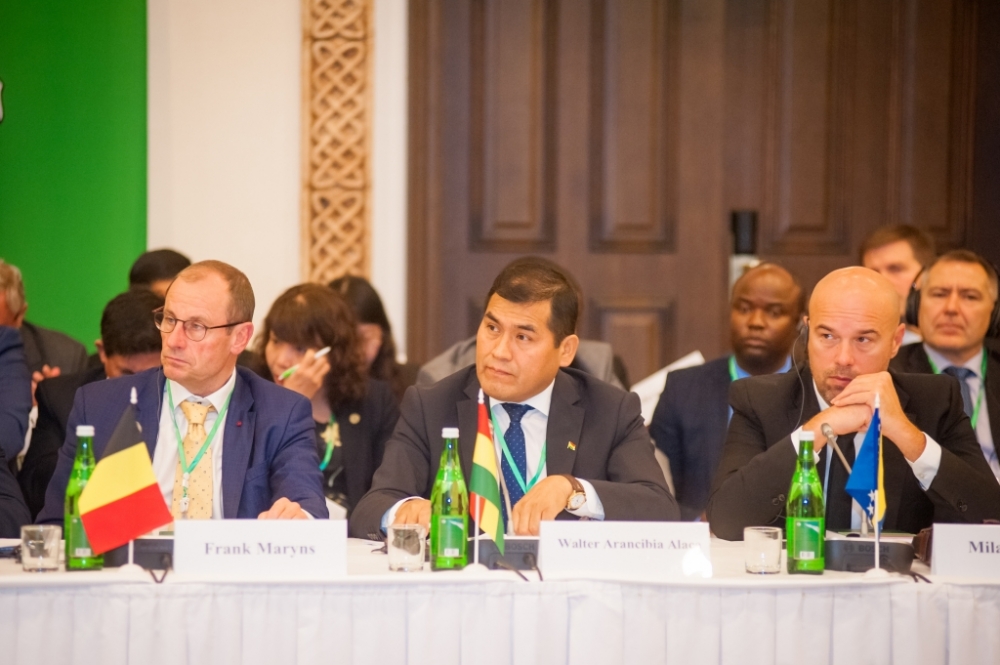
Milan Tegeltija, Conference in Sochi, October 2018
Both conferences were organized by FSSP - “Federal Bailiffs Service of the Russian Federation” (Федеральная служба судебных приставов). Coincidentally or not, Tegeltija was the first participant from Bosnia and Herzegovina invited to attend these conferences that were organized in Russia for the past ten years.
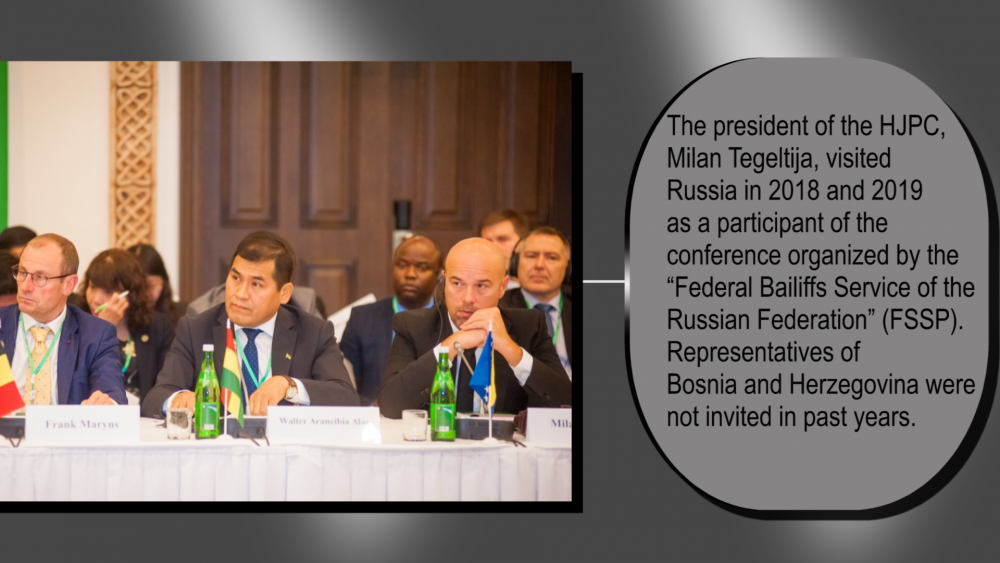
Some information on the FSSP will reveal that it is not just an institution, which by its name only covers “bailiffs”. The FSSP is officially a state body responsible for enforcing judicial decisions, searching and selling debtors’ property and a number of other formal tasks classified as protection of rights, freedoms and legitimate interests of citizens and organizations. The FSSP of the Russian Federation is managed by a director who is appointed and dismissed by the president of the Russian Federation, Vladimir Putin, personally.
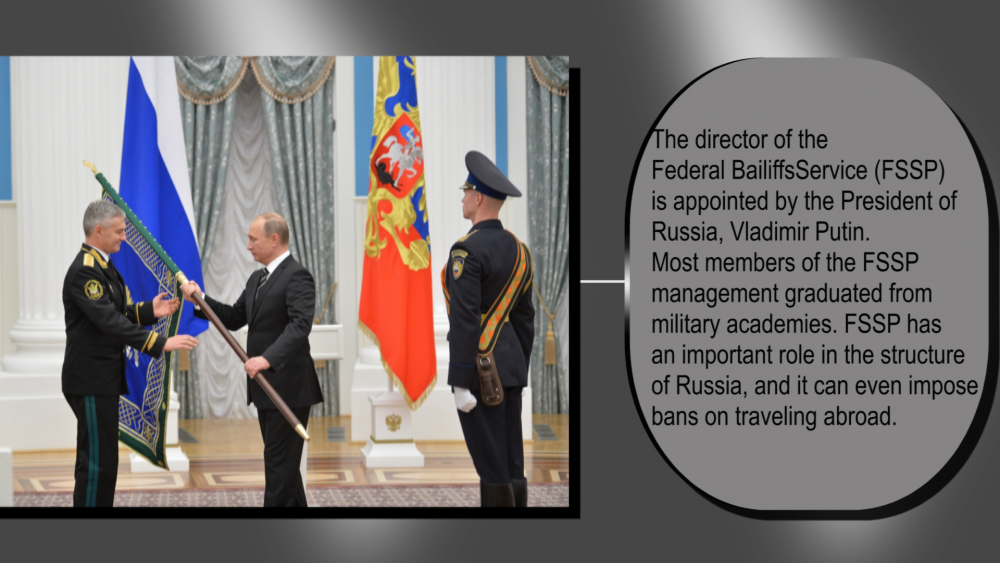
A look at the leadership structure of the FSSP shows that its members mostly come with a military training and previous experience in the military structures. Dmitriy Vasilyevich Aristov is the current director. At the beginning of 2020 Putin promoted Aristov to lieutenant general.
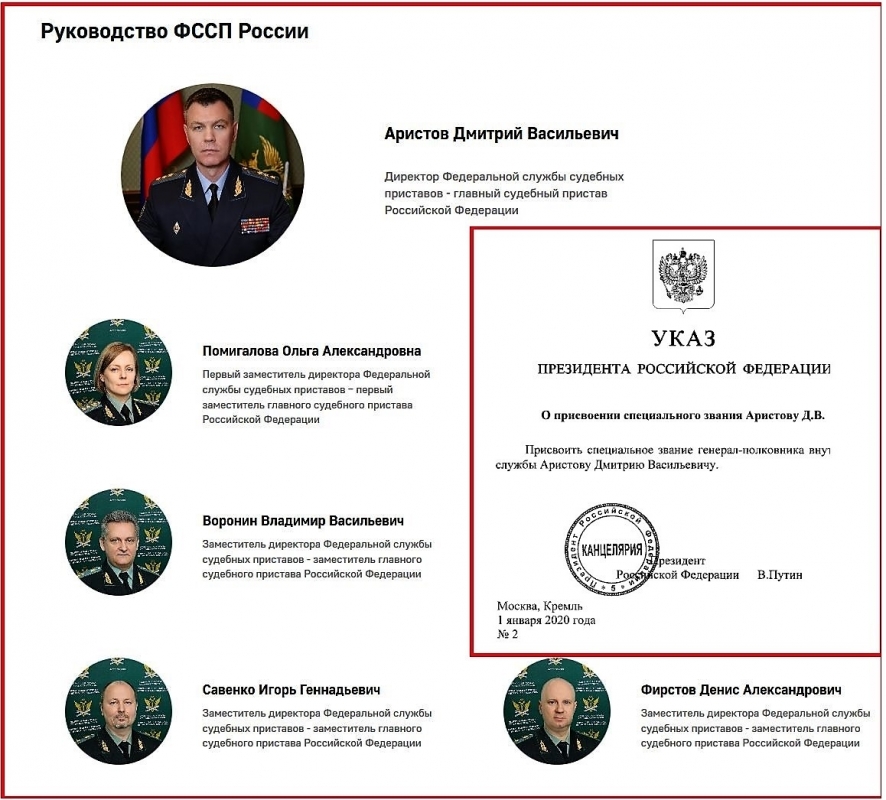
FSSP leadership and the decree of V. Putin
FSSP’s powers are increasing every year. It was used as a mean to exert pressure on protesters against Putin, when according to its own press release the organization recorded debts of the opposition activists against whom it subsequently, in line with the powers, undertook enforced collection action and led the procedure all the way to the arrest warrant. It also has the powers to expel foreign nationals, and gradual militarization can also be noticed. The armed units of the FSSP, which according to some sources have 1.500 persons, have been established with the regional departments. They undergo special training and are armed with automatic weapons. The exam for the so-called “green beret” of the FSSP was introduced in 2012.
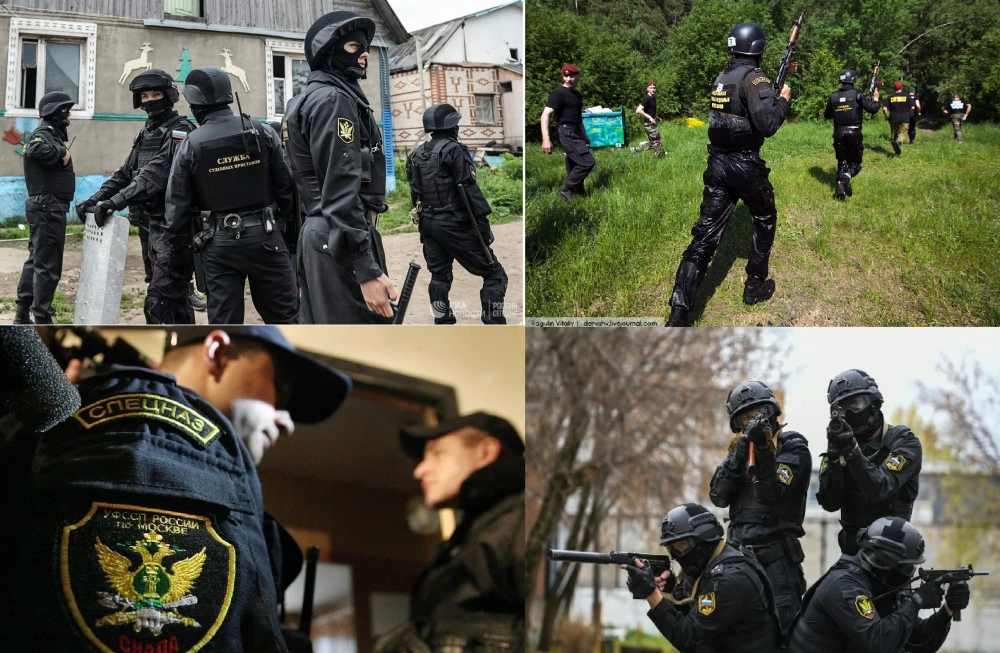
Tegeltija’s “hosts”
The previous director of the FSSP was Artur Olegovich Parfenchikov. Vladimir Putin personally introduced him after the appointment, presenting the organization with a decoration and its own flag. The FSSP played a significant role in the investigations against Russian oligarchs, which was the way for Putin to control them and to consolidate his authority.

Parfenchikov will later be appointed to a political position of the head of the Republic of Karelia. His good friend is the former president and prime minister Dmitry Medvedev, who started giving more powers to the FSSP at the beginning of the last decade. Russian and foreign media have often underlined his friendship with the head of Russian Federal Security Service (FSB), Nikolai.
Patrushev.
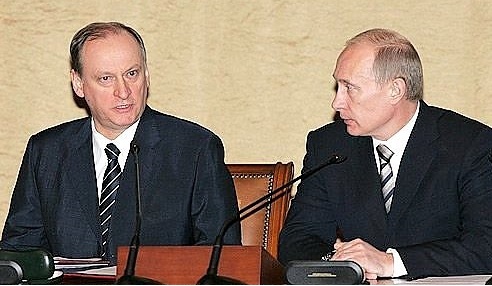
N. Patrushev and V. Putin
It is Patrushev about whom Žurnal wrote. At the time Patrushev was appointed Putin’s commissioner for the Balkans he held meetings with the HDZ BiH leader Dragan Čović and then-vice president of HDZ Croatia Milijan Vaso Brkić just before the 2018 General Elections in Bosnia and Herzegovina.
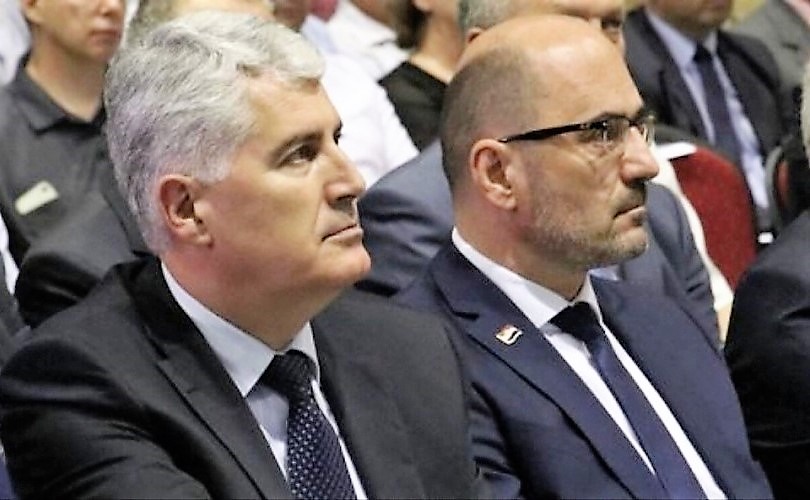
Dragan Čović and Milijan Brkić
There is another connection between the former director of the FSSP Parfenchikov and Bosnia and Herzegovina. According to his own words, his arrival to Leningrad and the beginning of his career did not happen because of the friendship with Medvedev, but because of the invitation by Valentina Matviyenko, Putin’s “Iron lady”.
As the chairwoman of the Federation Council of the Russian Federation, Matviyenko visited BiH in April 2018 at the invitation of the then-chairman of the House of Peoples of the BiH Parliament and former BiH Minister of Justice, Bariša Čolak. Her speech in which she accused the Western countries of meddling into internal affairs of BiH and said that the war was a civil conflict caused intense reactions of the domestic and international officials.
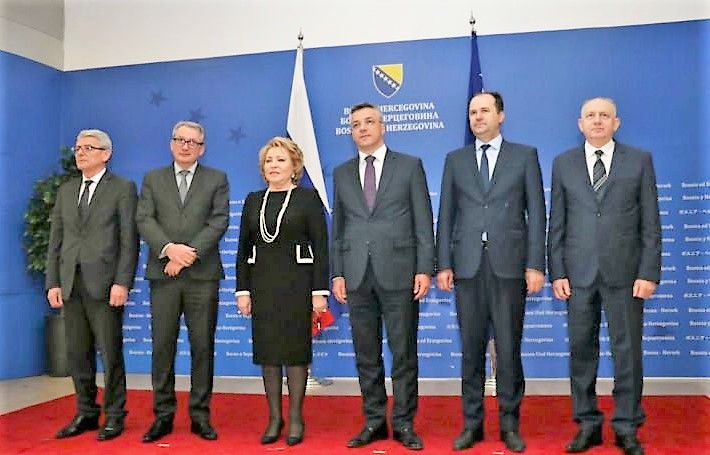
That is a short overview of the FSSP structure. The institution that hosted the President of the HJPC Milan Tegeltija in Russia in 2018 and 2019, having “the interests of the citizens and the state of Bosnia and Herzegovina in mind”, as the answer to Žurnal read.
One more detail. Tegeltija’s hosts, the FSSP, are unofficially registered as an aide of the Main Intelligence Administration of Russia (GRU) during this administration’s interference in the US 2016 elections.
“The Russian Embassy in Sarajevo has teams that plan and carry out their intelligence methods, whereat it is very important to underline that the military attaché and his assistance in the Embassy are members of the Main Intelligence Administration GRU. This administration has taken over authorities of the former KGB, which entails coercion and co-option, and even subversive activities. The competent bodies in BiH did not allow GRU lieutenant Vladislav Filipov to enter BiH, because he was expelled from Albania before. But, it did not do much harm to the Russian intelligence community, because they have officers of the same caliber at the Embassy and plenty of external associates, hidden spies “sleepers”. Intelligence agencies from Republika Srpska, which often present themselves as “extended arm” of Moscow, also have certain influence on the Russian associates of various profiles. It seeks to expand the influence on political and business elites and individuals in the strategic positions in order to create a relationship of dependence on Russia”, claims journalist Đuro Kozar.
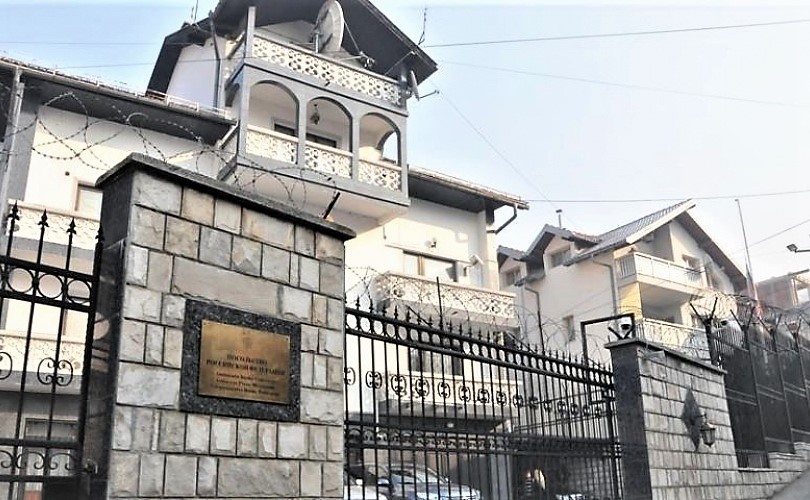
Embassy of the Russian Federation in Sarajevo
Political attitudes about Russia’s influence on developments in BiH have remained unchanged for years.
“The statement of the Ministry of Foreign Affairs of Russian, supporting the SNSD’s legislative proposal on withdrawal of foreign judges, shows that Russia is pursuing contradictory politics, the only goal of which is to destabilize the political situation in BiH,” said from SDA.
“Russia is being constantly accused due to the fact that its politics or diplomacy has a very strong influence in Bosnia and Herzegovina. I am ready to say that, unfortunately, there is very little Russian influence here,” said HDZ BiH leader, Dragan Čović during a visit to Russia earlier this year.
Significantly, the biggest public advocates of the destabilization of the judiciary are those who have the most reasons to fear the efficiency of that system. But the causes of the problem, as in many other segments of BiH’s life, are precisely those who need to solve it.
“Whether somebody likes it or not, it is politics that should create the environment for the judiciary. The fact that it is not up to the task at this moment is something else. We will never have a judiciary custom tailored for our citizens until our peoples agree on the values that the judiciary should safeguard,” says lawyer Almin Dautbegović.
“The Russian Federation uses different instruments to pursue its political, propaganda and psychological interests in BiH, thereat interfering in internal affairs. The focus is on weakening state functionality and preventing it from joining the NATO. It has the support of the RS authorities and the MPs of SNSD, because they are on the same page. During the adoption of the BiH budget for 2020, the members of Parliament from RS rejoiced that the promised financial resources were not provided on the basis of the Reform Program, which was sent to NATO as an annual plan. Apparently, such a scenario was written at the Russian Embassy in Sarajevo, and it had its “hand raisers” in the Parliament of BiH”, claims journalist Đuro Kozar.
Janusz Bugajski, a Senior Fellow at the Center for European Policy Analysis (CEPA) in Washington DC., stated recently in a text for Žurnal that Bosnia and Herzegovina has become a geopolitical hostage of Moscow, which wants to keep it in a status of “frozen” country with an unsolved internal conflict.
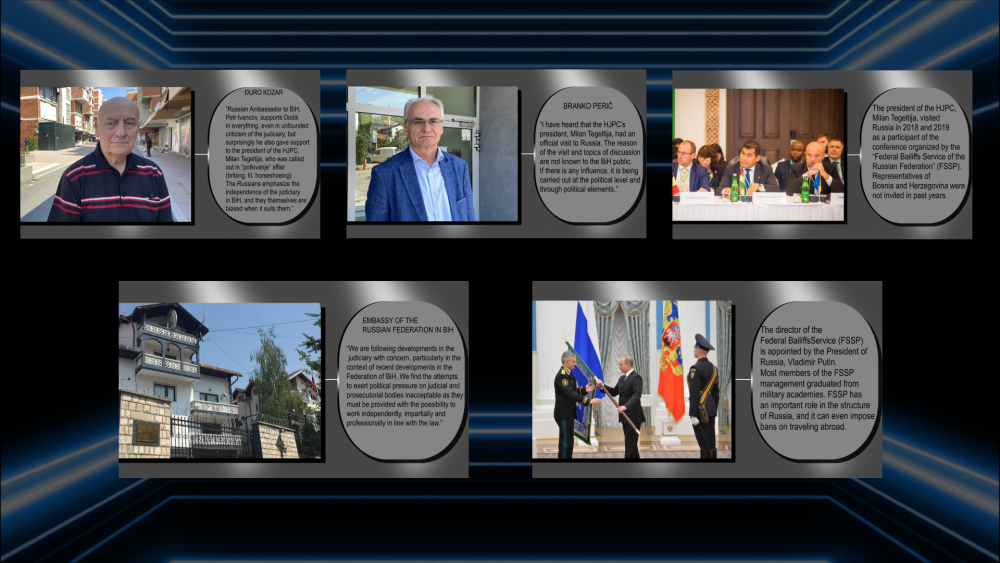
(zurnal.info)





